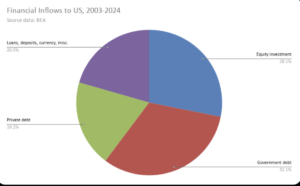Phil Magness eviscerates John Eastman’s attempt to defend the position that Trump’s IEEPA tariff are Constitutional.
Also from Phil Magness – here writing with Marc Wheat – is this clear explanation that Trump’s section 122 tariffs are also illegal. Three slices:
Section 122 allows a tariff lasting no more than 150 days to address a narrow set of problems, the most pertinent of which are “large and serious United States balance-of-payments deficits” (the other two cases — an imminent “depreciation of the dollar in foreign exchange markets” and creating an agreement with other countries to correct an “international balance-of-payments disequilibrium” — are less relevant to Trump’s arguments). A balance-of-payments deficit was essentially the natural economic consequence of a fixed exchange rate system where the value of the dollar was pegged to gold and other foreign currencies were pegged to the dollar. Since the direct convertibility of the U.S. dollar to gold was ended by the Nixon administration and never came back, Section 122’s balance-of-payments provision has never been used.
When prices are fixed by something other than market participants, surpluses or shortages inevitably result; a balance-of-payments deficit occurred when the official reserves of the United States, used to maintain the fixed exchange rate, were drawn down by the pressures of an overexpansion of the supply of dollars relative to the foreign demand to hold them. If sustained, this pattern could deplete the government’s reserve holdings in gold or other currencies, causing a balance of payments crisis. Under the Bretton Woods system, in place from 1945 to 1971, other governments could exchange their holdings of dollars for gold at $35 per ounce, drawn from U.S. government reserves.
Central banks have never been good at maintaining fixed exchange rates. Instead, their fixed-rate arrangements tend to break down, because they can’t resist overissuing their own currencies or simply because speculators fear they won’t stick to their commitments. The Bretton Woods system was no exception. Under pressure to help finance the Vietnam War and Great Society, the Fed created more dollars than foreign central banks were willing to accumulate. Instead, they cashed in dollars for gold.
When foreign governments chose to swap dollars for gold, the result could cause a “large and serious” drain on the United States’ official reserves. On its Official Reserve Transactions ledger, the U.S. Department of Commerce tracked the drain on its official reserves, which were known as “balance-of-payments deficits.”
…..
When Congress drafted Section 122 of what eventually became the Trade Reform Act of 1974, it clearly understood the difference between a “balance-of-payments deficit” and a balance-of-trade deficit. “A large decline in the U.S. net international monetary reserve position,” the bill’s authors explained, “would be evidence of a serious balance of-payments deficit.” An accompanying House committee report likewise takes “balance-of-payments deficit” to refer to a depletion of official reserves. (The same report also made clear that Section 122 was not to be used “for the purpose of protecting individual domestic industries from competition.”) The bill’s authors insisted, finally, that only a “substantial” balance-of-payments deficit that was likely to continue in “the absence of corrective action” could justify a Section 122 tariff — “a small or even a large balance-of-payments deficit of short duration” wouldn’t suffice. The Senate report on the bill even included a table depicting separate columns for the “trade balance” and the “balance of payments” from 1960–1974 to illustrate the distinctions in how each was measured.
…..
This technical economic distinction is not beyond the competence of courts to consider. American courts rightly seek to avoid in engaging in politics. The president will undoubtedly seek to take advantage of this fact by arguing that courts simply have no business questioning his determination that there is a “balance-of-payments” deficit because that determination is a political one left to his discretion by Section 122.
For the courts to accept this argument would be a dereliction of their duty to “say what the law is.” Despite some claims to the contrary, the role of the courts to assess the legality of the actions of the other branches, known as judicial review, was well established at the time of the Founding.
And, since the earliest days of our Republic, courts have relied on economists to settle disputes over technical economic terminology. In 1796 in a case called Hylton v. United States, Justice William Paterson consulted Adam Smith’s An Inquiry into the Nature and Causes of the Wealth of Nations, celebrating its 250th anniversary this year, for definitions of competing types of taxation.
If courts fail to play their crucial role as a last redoubt against illegal government action, the liberty of the people that government exists to secure will be lost. The Court’s decision in Learning Resources was an important but limited victory. Because Congress has chosen not to act to hem in the president’s unconstitutional actions, courts will have to continue to perform their role in our constitutional system so that the president will be constrained to his.
Here’s the abstract of a new paper by Bryan Cheang: (HT Scott Lincicome)
This essay argues that the notion of modest industrial policy, the idea that governments can lead structural transformation but remain modest, cautious, and adaptive, is incoherent and self-defeating. The very conditions that are said to demand modesty—radical uncertainty, complexity, and bounded knowledge—also render structural transformation implausible. If policymakers admit they are operating in unknown territory, then the idea that they can steer society in a coherent direction becomes less a policy strategy and more an article of faith. Yet this is precisely the tightrope today’s leading theorists attempt to walk. Dani Rodrik advocates a learning-oriented industrial policy while still gesturing toward ambitious structural change, seemingly hoping that modest means will deliver immodest ends. Mariana Mazzucato, for her part, insists the state must “pick a direction” and align society accordingly, but assures us this will be done inclusively and experimentally—as if consensus and coordination might emerge spontaneously on command. These contradictions are not incidental; they strike at the heart of the project. Industrial policy cannot be both radically uncertain and confidently directional. In the end, one cannot promise a revolution with a shrug. Advocates must choose: either scale down their ambitions or be honest about the scale of authority their vision requires.
Judge Glock reports on rising sales taxes. Here’s his conclusion:
The enduring mystery of the sales tax is why it never seems to go down. Other levies face frequent taxpayer revolts, but the hit to consumers from a penny sales tax is apparently abstract enough that most don’t notice it. Louisiana made one of the rare sales-tax reductions in recent years, in 2018, reducing its top rate by over half a cent. But this year, it returned to its previous rate of 5 cents as part of a general tax reform.
Even when politicians talk about the cost of living, the sales tax rarely comes up. Zohran Mamdani won the mayoral election in New York largely by promising to bring living costs under control, and other progressive city politicians have followed his lead. Yet none has suggested cutting the 8.875 percent surcharge that government adds to purchases. Instead, progressives in New York, like their counterparts nationwide, have pushed for new consumer taxes to fund their priorities, even while touting their affordability agendas.
The steady rise of sales taxes, along with their growing complexity, adds to the burden on businesses and consumers already strained by inflation. Politicians could act to ease that burden. It remains striking how few seem interested in doing so.
David French argues that Trump should have gotten Congressional approval before bombing Iran. Two slices:
Here’s the bottom line: Trump should have gotten congressional approval for striking Iran, or he should not have struck at all. And because he did not obtain congressional approval, he’s diminishing America’s chances for ultimate success and increasing the chances that we make the same mistakes we — and other powerful nations — have made before.
To make that argument is not to sacrifice our national interests on an altar of legal technicalities. Instead, it’s to remind Americans of the very good reasons for our country’s constitutional structure on matters of war and peace.
The fundamental goal of the 1787 Constitution was to establish a republican form of government — and that meant disentangling the traditional powers of the monarch and placing them in different branches of government.
When it came to military affairs, the Constitution separated the power to declare war from the power to command the military. The short way of describing the structure is that America should go to war only at Congress’s direction, but when it does, its armies are commanded by the president.
Perhaps the most important aspect of this constitutional structure is that it creates a presumption of peace. Our nation cannot go to war until its leaders persuade a majority of Congress that war is in our national interest.
…..
In 1848, at the close of the Mexican-American War, a first-term congressman named Abraham Lincoln wrote:
Kings had always been involving and impoverishing their people in wars, pretending generally, if not always, that the good of the people was the object. This, our convention understood to be the most oppressive of all kingly oppressions and they resolved to so frame the Constitution that no one man should hold the power of bringing this oppression upon us.
Those words were true then, and they’re true now. No matter what he thinks, Trump is not a king. But by taking America to war all on his own, he is acting like one.
“Bernie Sanders is lying about AI data centers.”
Megan McArdle isn’t buying the AI-spells-doomsday bit. A slice:
And remember, too, how limited our imaginations are in the face of a true technological revolution: Neither 18th-century artisans nor their industrial rivals could have deduced the five-day workweek, the interstate highway or the rise of mass higher education from the operations of a primitive textile mill. Whatever is coming, it will almost certainly be weirder and more surprising than any doom-filled prophecy or utopian fantasy you’ll read today.
National Review‘s Editors rightly decry many of the consequences of the release of the Epstein files. A slice:
Should Larry Summers have been pursuing an affair with an adult fellow economist to whom he was apparently a mentor? No, of course not. But should we have violated every rule and norm around how we typically handle raw investigative materials in a federal investigation in order to nail Summers for a lapse that has nothing to do with what was the purpose of the release of the files?
We got to this place because voices on the right — including some that now have significant responsibility in the administration — stoked lurid conspiracy theories about Epstein for years. Then, Democrats opportunistically picked up the mantra last year when they realized that the release of files was a way to damage Trump politically. The dam broke in Congress in part because no one trusted Attorney General Pam Bondi to handle the matter in a competent, aboveboard manner.


 It is just here, I submit, that the ultimate issue is joined, on the question of whether men shall be inviolable persons or as things to be disposed of; it is here that the struggle between barbarism and civilization, between despotism and liberty, has always been fought. Here it must still be fought.
It is just here, I submit, that the ultimate issue is joined, on the question of whether men shall be inviolable persons or as things to be disposed of; it is here that the struggle between barbarism and civilization, between despotism and liberty, has always been fought. Here it must still be fought. Well, excuse me, but modern economic growth in its global form has done more for workers and the environment than any army of government inspectors, regulators, customs officers, or IRS accountants. We Americans are rich not because of unions or anti-trust or the Occupational Safety and Health Administration but because on the whole we have let capitalism work.
Well, excuse me, but modern economic growth in its global form has done more for workers and the environment than any army of government inspectors, regulators, customs officers, or IRS accountants. We Americans are rich not because of unions or anti-trust or the Occupational Safety and Health Administration but because on the whole we have let capitalism work. As the scope and role of government expands – whether by covering a larger area and population or by performing a wider variety of functions – the connection between the people governed and the people governing becomes attenuated. It becomes impossible for any large fraction of the citizens to be reasonably well informed about all items on the vastly enlarged government agenda, and, beyond a point, even about all major items. The bureaucracy that is needed to administer government grows and increasingly interposes itself between the citizenry and the representatives they choose. It becomes both a vehicle whereby special interests can achieve their objectives and an important special interest in its own right.
As the scope and role of government expands – whether by covering a larger area and population or by performing a wider variety of functions – the connection between the people governed and the people governing becomes attenuated. It becomes impossible for any large fraction of the citizens to be reasonably well informed about all items on the vastly enlarged government agenda, and, beyond a point, even about all major items. The bureaucracy that is needed to administer government grows and increasingly interposes itself between the citizenry and the representatives they choose. It becomes both a vehicle whereby special interests can achieve their objectives and an important special interest in its own right. But people will say: if foreigners swamp us with their products, they will carry off our money.
But people will say: if foreigners swamp us with their products, they will carry off our money.

